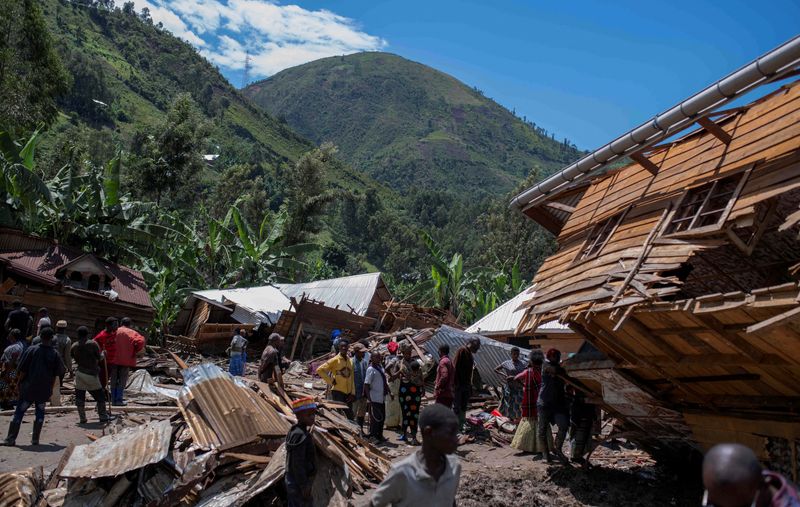Thousands still missing as Congo flood survivors search for relatives
2023.05.09 12:43
2/2

© Reuters. FILE PHOTO: Congolese civilians gather after the death of their family members following rains that destroyed buildings and forced aid workers to gather mud-clad corpses into piles in the village of Nyamukubi, Kalehe territory in South Kivu province of th
2/2
By Djaffar Sabiti
NYAMUKUBI, Democratic Republic of Congo (Reuters) -The death toll from flooding in eastern Democratic Republic of Congo crept higher on Tuesday as aid workers found more bodies among the muddy devastation and as wounded residents succumbed to their injuries in an underequipped local clinic.
The floods, in a remote, mountainous area of South Kivu province, ripped through the riverside villages of Nyamukubi and Bushushu five days ago, razing houses, destroying crops and killing more than 400 people, the deadliest natural disaster in Congo’s recent history.
They have highlighted the vulnerability of people to climate change in many parts of Africa where poor urban planning and weak infrastructure means communities often cannot withstand increasing bouts of extreme weather.
In Nyamukubi, entire neighbourhoods have been run over with boulders, and the stink of dead bodies wafts from the earth, a Reuters reporter at the scene said. The homeless are packed into the few public buildings left intact, with poor sanitation.
Aid efforts have been hobbled by a lack of access and resources. The Red Cross believes that over 8000 people are need assistance.
More than 5,500 people are still unaccounted for, local administrator Thomas Bakenga Zirimwabagabo said.
Government officials brought blankets, food and a handful of coffins to Nyamukubi on Tuesday. They donated money to a local clinic where three people died on Tuesday, and gave around $1,100 each to 200 affected families.
But the delegation did not take part in burials as planned or visit Bushushu, where the death toll is believed to be greater because it was market day when the flood hit.
Residents are terrified. Many wept for lost loved ones, trampled crops and ruined houses. Some asked the government to rehouse them away from a zone where water rushes off the lush hillsides, swelling the river that runs past their houses.
Aid workers put the dead in mass graves dug over the weekend, drawing complaints from civil society groups and prompting the government to promise assistance for more dignified burials.








